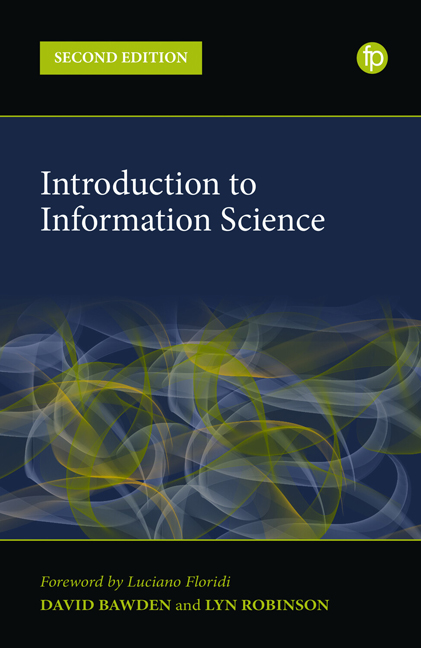Book contents
- Frontmatter
- Contents
- Figures
- Preface
- Foreword – Curators of Semantic Capital
- List of Acronyms
- 1 The Information Science Discipline
- 2 History of Information: the Story of Documents
- 3 Philosophies of Information
- 4 Paradigms, Turns and Theories in the Information Sciences
- 5 Information
- 6 Documents and Documentation
- 7 Domain Analysis
- 8 Information Organisation
- 9 Digital Technologies and Data Systems
- 10 Information Systems
- 11 Informetrics
- 12 Information Behaviour
- 13 Communicating Information: Changing Contexts
- 14 Information Management and Policy
- 15 Information Law and Ethics
- 16 Information Society
- 17 Digital (Onlife) Literacies
- 18 Research in the Information Sciences
- 19 The Future of the Information Sciences
- Additional Resources
- Index
7 - Domain Analysis
Published online by Cambridge University Press: 21 April 2022
- Frontmatter
- Contents
- Figures
- Preface
- Foreword – Curators of Semantic Capital
- List of Acronyms
- 1 The Information Science Discipline
- 2 History of Information: the Story of Documents
- 3 Philosophies of Information
- 4 Paradigms, Turns and Theories in the Information Sciences
- 5 Information
- 6 Documents and Documentation
- 7 Domain Analysis
- 8 Information Organisation
- 9 Digital Technologies and Data Systems
- 10 Information Systems
- 11 Informetrics
- 12 Information Behaviour
- 13 Communicating Information: Changing Contexts
- 14 Information Management and Policy
- 15 Information Law and Ethics
- 16 Information Society
- 17 Digital (Onlife) Literacies
- 18 Research in the Information Sciences
- 19 The Future of the Information Sciences
- Additional Resources
- Index
Summary
Domain analysis suggests that the specific competencies that information specialists have, or should have, are information about information infrastructures and information retrieval … Domain analysis further suggests that subject qualifications and LIS qualifications are not independent of each other.
Birger Hjørland (2017, 452)Introduction
The nature of information and knowledge, and the ways in which information services are provided, differ considerably in different contexts. This is an important theoretical and practical issue for the information sciences. In this chapter we consider what is meant by an information context or domain, and how domains may be characterised or understood, with a note on the importance of terminology in defining and representing domains. We then examine domain analysis, the approach developed for this topic. Some brief examples of particular domains are given to show the distinctions which may be made between them, and their effects in practice. Finally, we consider the changing nature of information work in specific domains.
Information domains
The contexts of information communication and use may be described in various ways: by geographic area, e.g. Europe; by type of institution, e.g. universities; or by the demographics of the information users, e.g. children and young people. The most helpful distinction, particularly for understanding information resources and information practices, is the information domain, which often aligns with an academic discipline, e.g. mathematics or history; a professional or vocational activity, e.g. healthcare or finance; or a leisure interest, e.g. book collecting; or with a more loosely defined area, e.g. everyday information. Hjørland (2010, 1650) suggests that a domain may be a scientific discipline or a scholarly field. It may also be a discourse community connected to a political party, a religion, a trade, or a hobby. Domains are defined and explained by three dimensions: ontological, epistemological and sociological. The ontological dimension defines the domain by its main object of interest: botany by plants, history by the past, theology by the divine, etc.; this is the most usual way of defining a domain. The epistemological dimension relates to the kind of knowledge in the domain, or perhaps different kinds of knowledge associated with different paradigms or ways of understanding. The sociological dimension relates to the kind of people and groups involved in the domain.
- Type
- Chapter
- Information
- Introduction to Information Science , pp. 113 - 132Publisher: FacetPrint publication year: 2022



